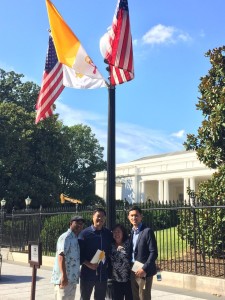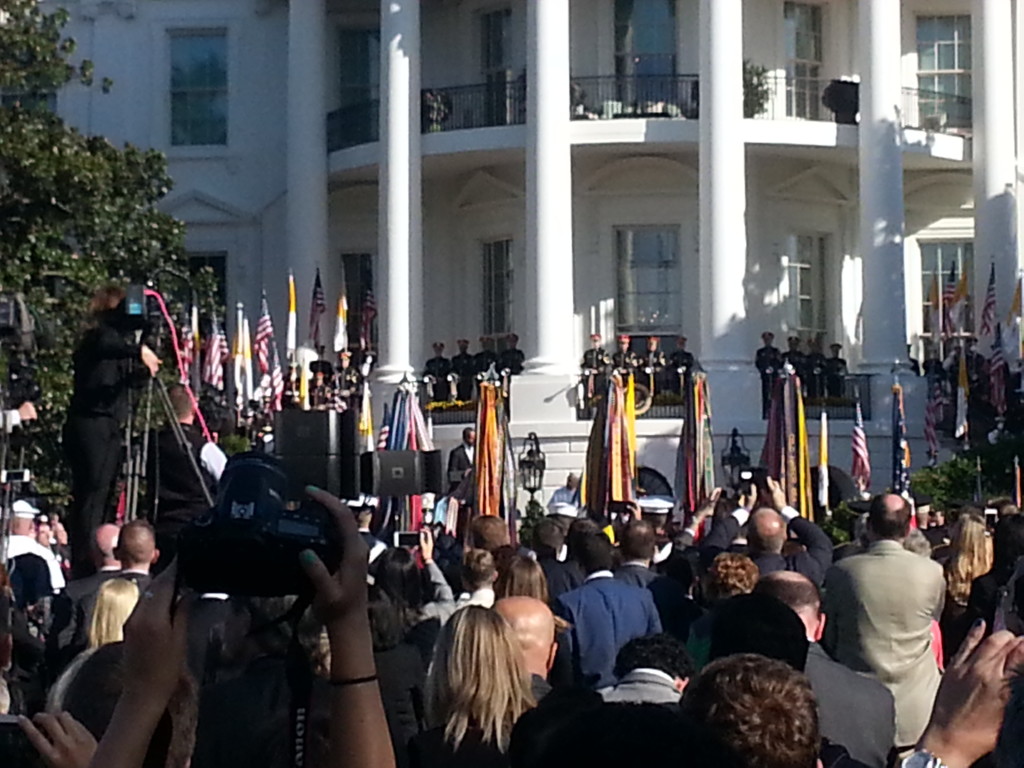 On September 23rd, I was honored to be in the audience for Pope Francis’ official welcome to the United States. Braving an early morning start at 2am, getting in line at 4am, and hours waiting for the event to start at 9:30am, I joined thousands of my closest friends on the South Lawn of the White House to witness the first African American President welcome the first Pope from the Americas. Washington, DC has hit a fever pitch in recent days in anticipation for the Pope’s visit, and this welcome ceremony did not disappoint, with pomp and fanfare appropriate for the arrival of a head of state, and eloquent speeches loaded with political and spiritual meaning. As a practicing Catholic who doesn’t always see eye to eye with either of these men, I was nevertheless humbled and excited to be part of this historic occasion. Luckily, our DEC member (and my generous hosting office) the National Hispanic Council on Aging is located literally around the corner from the White House and provided an invaluable launching point for the day’s activities.
On September 23rd, I was honored to be in the audience for Pope Francis’ official welcome to the United States. Braving an early morning start at 2am, getting in line at 4am, and hours waiting for the event to start at 9:30am, I joined thousands of my closest friends on the South Lawn of the White House to witness the first African American President welcome the first Pope from the Americas. Washington, DC has hit a fever pitch in recent days in anticipation for the Pope’s visit, and this welcome ceremony did not disappoint, with pomp and fanfare appropriate for the arrival of a head of state, and eloquent speeches loaded with political and spiritual meaning. As a practicing Catholic who doesn’t always see eye to eye with either of these men, I was nevertheless humbled and excited to be part of this historic occasion. Luckily, our DEC member (and my generous hosting office) the National Hispanic Council on Aging is located literally around the corner from the White House and provided an invaluable launching point for the day’s activities.
Ai-Jen Poo, Executive Director of the National Domestic Workers Alliance, part of our friends at the Caring Across Generations campaign, came to Washington, DC on the same day as the Pontiff. Ai-Jen, who spoke at the recently concluded 2015 White House Conference on Aging, joined the #100women100miles effort led by the We Belong Together Coalition. We Belong Together, which fights for common sense immigration reform, was led by 100 women walking 100 miles from a detention center in York, PA to Washington, DC, to bring a message to the Pope of human dignity for the world’s migrants.

My own path to the Pope today, and to my faith life in a broader sense, is in many ways, a unique one. I did not grow up in a typical Filipino American household. Although they are part of a community that is about 65% Roman Catholic, my parents have a “mixed” marriage in terms of their faith and had a laissez-faire policy about our spiritual upbringing. Thanks to being in dialogue with a good friend in high school, and despite burgeoning feelings and ideas as a young gay man that in some instances profoundly conflicted with church teachings, I decided to pursue my own faith life in the Catholic Church. The community I found the following year in UC Berkeley’s Newman Hall Parish was warm, inclusive, progressive, and included fellow Filipino American students I was beginning to organize with on other issues. In those heady college days I found my spiritual home which, despite a long and sometimes bumpy road, continues to ground me in many ways.
Religion can often be a study in contradictions. The spiritual and the mundane, the sacred and the profane, ideas that are seemingly at odds are asked to coincide and coexist in many faith traditions. Despite the tradition of separation of church and state in our polity, the increasing role religion is playing in political affairs often is perceived to offer a forced choice between a religious conservatism and a secular progressivism. Part of the Pope’s message as I received it this morning seeks to disrupt that binary. Although his positions on issues such as reproductive rights and LGBT equality map out unevenly against my own, his most brilliant move of the morning was to own what is often a core contradiction of religion: although religion often relies on tradition and a consistency of dogma and practice to achieve its ends, the Pope reminded us, “we know that things can change.” His persistence in engaging audiences on his message, his consistency in that message, and his insistence on the righteousness of that message make for a compelling package that, take it or leave it, cannot be denied.
The opinions expressed in this article are those of the author and do not necessarily reflect those of the Diverse Elders Coalition.

